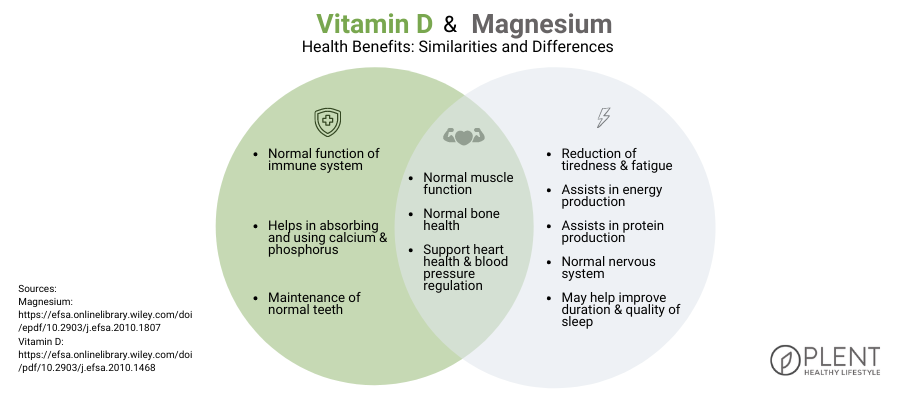How does Magnesium and Vitamin D benefit each other
- By Bea Recuerdo (BSc)
- 16 Mar 2022

What is Magnesium?
Let's first talk about magnesium for just a minute. Magnesium is the second most dominant mineral inside your body's cells. It plays a role in over 300 bodily functions. Bones and teeth account for around 60% of the 25g, whereas muscle accounts for about 40%. Magnesium is necessary for your neurological, immunological, electrolyte balance, and other bodily functions (Source: N.I.H.).
What is Vitamin D?
While we have Vitamin D, also known as the "sunshine vitamin," It is a fat-soluble vitamin known to help increase your body's calcium absorption and is necessary to help you maintain bone health (Source: Poseidon).
But aside from that, what else can Vitamin D & Magnesium do?
Maintaining the physiologic activities of many of your organs requires an optimal balance of magnesium and vitamin D.

In the image above, you can see the benefits of Vitamin D and Magnesium in a detailed manner. In the Venn Diagram, we can see that together, Magnesium and Vitamin D can benefit our bone, muscle, and heart health. Individually, you can see their importance in immunity, brain function, and other body processes to help maintain a healthy body.
Now comes the million-dollar question:
What happens when you take Vitamin D & Magnesium together?
According to studies, magnesium is a necessary component for vitamin D production and activation. While in return, it helps increase intestinal magnesium absorption. This process becomes a cycle that helps maintain the balance of the two nutrients in the body (Source: Degruyter).
What happens when one of the two is insufficient?
Vitamin D both from outside and within your body may not provide optimal health advantages if magnesium levels are inadequate, as vitamin D bioactivity is a magnesium-dependent process (Source: Degruyter).
When magnesium homeostasis your body is not maintained, vitamin D effectiveness and therapeutic effects are significantly reduced.
While if Vitamin D is deficient, the phosphate and magnesium absorption in the intestine is affected, influencing skeletal mineralization, and in layman's terms, can have a negative impact on your bone health. (Source: NCBI).
As per research, deficiencies in either Magnesium and Vitamin D (or both) may result in some disorders such as:
- Skeletal deformities
- Cardiovascular diseases
- Metabolic syndrome
(Source: NCBI).
How do you add Vitamin D & Magnesium to your diet?
Naturally, you can find these two nutrients in food. Magnesium can be obtained from green leafy vegetables, legumes, nuts, seeds, whole grains, and food products fortified with Magnesium (Source: N.I.H.).
On the other hand, your body naturally produces Vitamin D when your skin is exposed to the sun. It can also be found in food products fortified with Vitamin D! (Source: N.I.H.)
Is there another way of adding Vitamin D & Magnesium to your diet?
Yes! Here at Plent, we understand that specific challenges hinder you from getting enough sunlight or eating enough green leafy vegetables in your day-to-day routine.
Check out our Plantforce Ionic Magnesium and Plantforce Vegan Vitamin D3 for more information.
While Magnesium and Vitamin D are essential for the body, it is crucial to not take too much of their supplements and follow the suggested serving size.
Take away
In this blog, you've learned that magnesium and Vitamin D work well together in maintaining a healthy body and are actually vital to each other. The two are a match made in heaven—like milk and cookies or peanut butter and jelly. Except even better because they're both super good for you.





























